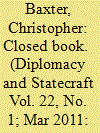| Srl | Item |
| 1 |
ID:
102953


|
|
|
|
|
| Publication |
2011.
|
| Summary/Abstract |
This article focuses on British intelligence in China, Japan, and Korea from the end of the Second World War to the outbreak of the Korean War in June 1950. It seeks to ascertain whether the collection of secret intelligence and its subsequent interpretation provided an accurate picture of Soviet and local communist intentions in East Asia. Since the war against Japan began, the region was largely an American responsibility and remained so after 1945 when they occupied Japan, Korea below the 38th parallel, and sent forces to China. Much of the intelligence effort for East Asia also devolved upon the Americans. Yet, the British retained an intelligence interest there not least because of their extensive commercial assets in China and the region's proximity to Britain's imperial position in Southeast Asia. That interest gathered pace after growing Communist threats inside China and Korea. However, the available intelligence resources for the Far East as a whole were scarce, making it difficult to piece together a clear picture of fast moving events in East Asia.
|
|
|
|
|
|
|
|
|
|
|
|
|
|
|
|
| 2 |
ID:
085082


|
|
|
|
|
| Publication |
2008.
|
| Summary/Abstract |
This article seeks to analyze the Foreign Office reaction to the Cicero spy affair. Papers newly released in 2003 and 2005 provide some fascinating insights into leaks that were occurring at the Ankara embassy long before Cicero, how diplomats tried to trap the notorious spy and how the Foreign Office sought to block any outside interference in its investigations, particularly from the Security Service (MI5). The article also sheds light on how the Foreign Office attempted to deal with the fallout when the full scale of the Cicero leak became publicly known. At the time, the Foreign Office investigation into the leak failed to identify Cicero but it did highlight that Sir Hughe Knatchbull-Hugessen, the British Ambassador to Turkey, was culpable in allowing documents in his possession to be photographed. It appeared, however, that Hugessen had got off lightly when he was rewarded with the ambassadorship at Brussels in September 1944. Why had this situation come about? Was the Foreign Office closing its ranks to protect one of its own? And, did this confirm oft-repeated accusations that as an institution, the Foreign Office could not be trusted when it came to security?
|
|
|
|
|
|
|
|
|
|
|
|
|
|
|
|